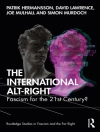The EU’s international environment is increasingly characterized by power-politics, growing great-power rivalry and war on its borders. This has challenged the liberal-internationalist identity that has been at the heart of the European Union since its birth. This book analyses how the EU has responded to these new realities in world politics.
قائمة المحتويات
1. EU Foreign Policy Paradigms in a World of Change: Towards a Conceptual Framework – Knud Erik Jørgensen, Tonny Brems Knudsen and Laura Landorff
2. The EU and Reactionary Internationalism: Policy Paradigms for a Changing World Order – Nicholas Michelsen, Pablo De Orellana and Filippo Costa Buranelli
3. Between Global Governance and Geopolitical Europe: The EU’s Paradigmatic Debate of “What kind of Power” Revisited – Joachim Koops
4. A Grand Strategy for Europe? The Role of the High Representative and the EEAS – Anna Michalski
5. The EU and the US after Russia’s Invasion of Ukraine: A New Convergence on Strategic Autonomy? – Iulian Romanyshyn
6. The EU and the Imperial Narrative: The Response to Russia – Ali Tekin
7. EU’s Changing Strategy towards Russia: The Response to Aggression – Anne-Sophie Maass
8. Beyond the Paradigm of Unity: Embedded Minilateralism in European Foreign Policy – Gjovalin Macaj
9. The Functionalist Policy Paradigm and the Technical-Political Divide in the EU’s Council Working Groups – August Danielson
10. The EU as Global Climate Leader? Carbon Border Taxation and Technology Diffusion – Gert Tinggaard Svendsen
11. The EEAS and the Politics of EU Visibility: Digitalisation and Strategic Innovation – Elsa Hedling
12. Conclusion and Wider Perspectives – Laura Landorff, Tonny Brems Knudsen and Knud Erik Jørgensen
عن المؤلف
Knud Erik Jørgensen is Professor in the Department of Political Science at Aarhus University.












